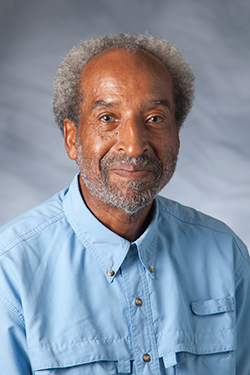Duke Flags Lowered; Pioneering Historian Raymond Gavins Dies (UPDATED)

Raymond Gavins, a professor of history who among many contributions to Duke helped launch the Department of History’s Oral History Program, died Sunday.
Gavins left a legacy of “firsts.” In 1970, he became the first African-American to receive a Ph.D. from the University of Virginia Graduate Schools of Arts and Sciences. He also was the first African-American to join the Duke history faculty.
A veteran of the Civil Rights movement who joined scholarship with activism, Gavins was also known for his mentorship to young faculty and students at Duke and institutions across the country.
“Ray made a myriad of contributions to our campus and beyond. As Bill Chafe has recalled,” said former department chair John Martin in a message to department faculty and students. “Ray played a key role in the oral history program, the Center for the Study of Civil Rights and Race Relations, and the Behind the Veil Project of the Center for Documentary Studies.’
“And, as is well known, Ray served as a mentor to countless graduate and undergraduate students alike in a career that has spanned forty-five years at Duke."
Gavins’ academic specialties were African-American and American history. He joined the Duke faculty in 1970 and was promoted to associate professor in 1977 and full professor in 1992. His oral history collaboration with researchers at Duke and elsewhere greatly expanded the range of voices available to scholars studying the stories of the Civil Rights era.
His most recent work came out of the Behind The Veil Project, which conducted more than 1,350 oral history interviews with African Americans from across the South, resulting in a new source base for documenting life during the Jim Crow era. Out of this project, Gavins asked how African Americans defined citizenship in the Jim Crow era and the ways they attempted to demand fulfillment of the promises of the Civil Rights constitutional amendments of the Reconstruction period.
He has authored two books, co-edited another and published 77 scholarly articles, book chapters, essays, and reviews. His most recent book, “The Cambridge Guide to African American History,” was published in February. It explored the means and strategies that African Americans used to pursue recognition as full citizens of the United States.
Co-recipient of the 1996 Oral History Association Distinguished Oral History Project Award and the 2002 Southern Regional Council Lillian Smith Book Award, Gavins also received the 2008 Southern Historical Association John W. Blassingame Award “in recognition of his distinguished scholarship and mentorship in African American history.”
A native of Atlanta, Gavins attended Virginia Union University in Richmond as an undergraduate. After graduating in 1964, he broke color barriers to join the graduate program at the University of Virginia. His arrival at Charlottesville came just two years after rioting during the desegregation of state universities in Mississippi and Alabama. Gavins said he faced struggles but, like many other pioneering African-American students throughout the South at the time, succeeded in winning support through hard work.
“I knew that I would get stares, isolation, loneliness. I think that I was remarkably well prepared for that,” Gavins said in an article for the University of Virginia. “Not everyone talked to me; there were a few people who did. What I recalled a lot was certainly being alone a lot, in the dining halls and the libraries. No one bothered me.”
Survivors include his wife, Thurletta M. Brown-Gavins; a daughter, Dr. Marva V. Gavins of Houston; a son, Raymond T. Gavins (and wife Raqeeba) of Atlanta; five grandchildren: John Raymond Guidry and Kathryn C. White, both of Houston, and Anaya, Nia, Malcolm Gavins of Atlanta; three sisters: Gracie Isom and Lena Mae Gavins, both of Atlanta; and Juanita Robinson of Columbus, Ga.; and a sister-in-law: Bernice Gavins of Decatur, Ga.
The funeral will be held at 11 a.m., Friday, May 27, at Mount Level Missionary Baptist Church, 316 Hebron Road in Durham.
In lieu of flowers, memorials may be made to the Southern Poverty Law Center (SPLC), 400 Washington Avenue, Montgomery, AL 36104. SPLC has asked that "in memory of Dr. Raymond Gavins" be indicated on the "For" line.